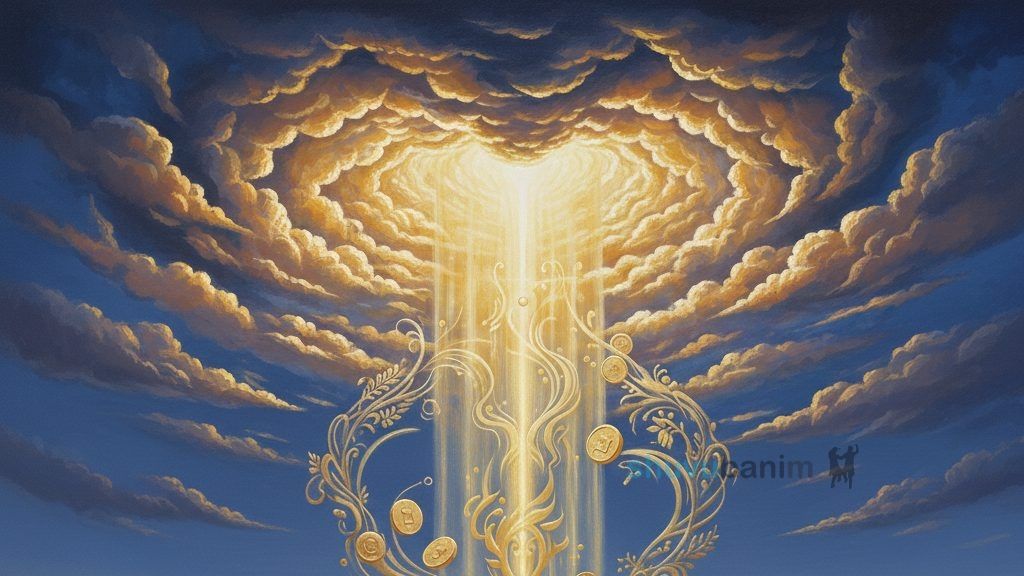[Gan Eden - Artist Yoram Raanan]
At the onset of the third day, the earth was still immersed in water. Hashem commanded, "Let the waters gather!" At this, hills and mountains began to emerge, allowing the water to descend into the valleys.
G-d commanded the earth to grow all different kinds of plants that exist. He ordered that each plant propagate its own kind, and that it contain seeds for planting. He further commanded that earth to grow trees which produce fruit, the wood having the same taste as the fruit. This fruit must have seeds with which new trees could be planted. Each kind of tree grows alone, away from other types; a pear tree does not grow near an apple tree.
Every plant and tree has a guardian angel which tells it to grow and ripen (Zohar Chadash 10b), except the Four Species taken on Sukkot - the etrog (citron), date palm, myrtle and willow. G-d Himself oversees these; this is one reason why the blessing is recited over them on Sukkot.
All plants were made in the manner prescribed by G-d. Even trees that are now fruitless originally had fruit so as to fulfill G-d's command. (Ramban; Yalkut)
Another opinion is that there is no difference between the original trees and the way they are now. (Abarbanel)
Some say the Etz Hadaat (Tree of Knowledge) in Gan Eden had wood which had the same taste as its fruit.
At the same time as it produced the trees and grass of the entire world, the earth also brought forth the vegetation of Gan Eden. (Bereishit Rabbah) Yet Chazal considered Gan Eden a separate creation. This is because the trees and grass of Gan Eden, unlike those of the rest of the world, are eternal.
Each tree in Gan Eden is symbolic of a higher spiritual purpose. Gan Eden is Hashem's palace on earth. Today, no one knows its location, for Hashem concealed it from us. It was in the Garden of Delight that Hashem placed Adam before he sinned and which the tzaddikim will once again enter.
To give us a concept of the enjoyments of Gan Eden, our chachamim have described to us its pleasures in human terms.
When a tzaddik enters Gan Eden, the angels remove the garments he wore in the grave and clothe him in eight layers of Clouds of Glory. They place two crowns on his head, one of pearls and one of gold. He is given eight myrtle branches to hold.
Each tzaddik in Gan Eden possesses his own chuppah according to the level of his spiritual attainment.
In every chuppah there is a table of pearls and diamonds. Sixty angels standing at the head of each tzaddik say to him, "Go and eat honey with joy because you have studied the Torah which is like honey. Drink wine made from the grapes preserved from the Six Days of Creation because you have studied Torah which likened to wine."
There are 800,000 trees in Gan Eden, each one different from the next in shape and appearance. The Tree of Life is in the center, over-shadowing the entire garden. It is comprised of 500,000 different flavors and its sweet scent radiates to the ends of the world. Underneath it sti the talmidei chachamim (Torah scholars) who expound upon the Torah and learn it from Hashem, Who dwells in their midst.
No one in this world, not even the prophets, ever envisioned the complete picture of the reward which Hashem will bestow in Gan Eden upon a person who lives a Torah life, as it states, "No eye (not even that of a prophet) has ever envisioned what He will do for one who waits for Him, besides yourself, G-d."
Nevertheless, some of the chachamim were allowed glimpses of Gan Eden.
Sources: Midrash Rabbah, Meam Loez





















